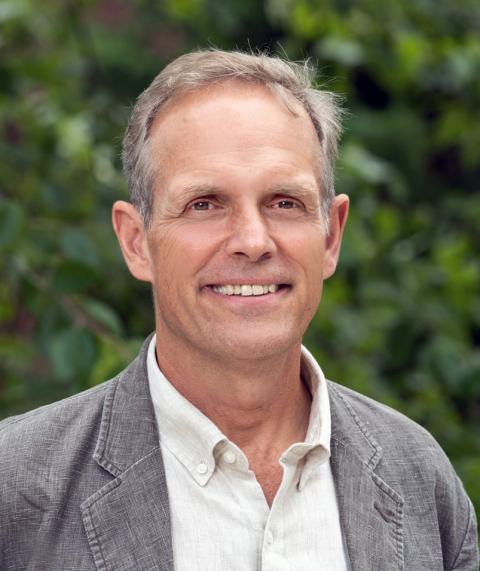
In August, David Mortensen joined COLSA as the new chair of the Department of Agriculture, Nutrition, and Food Systems. Prior to assuming this role, Mortensen was the Distinguished Professor of Weed and Applied Plant Ecology at the Penn State College of Agricultural Sciences, where he received the Outstanding Graduate Teacher and Mentor award by Penn State’s president earlier this year. Along with his new position, Mortensen is also the second year into a five-year term as a farming systems ecotoxicology expert on the National Organic Standards Board.
Below, Mortensen — who prefers to go by Dave — answers a few questions about his role at COLSA, what lead him to his career as a researcher and educator, and why finding sustainable ways to feed the world is more important than ever.
COLSA: What excites you most about coming to UNH and joining the Department of Agriculture, Nutrition, and Food Systems?
David Mortensen: I have spent much of my career in departments where we addressed the front end of the "farm to fork" continuum, which is to say, the sustainable cultivation of food crops and animal husbandry. Joining the Agriculture, Nutrition and Food Systems Department means I'm joining a dedicated group of thinkers, teachers and researchers dedicated to spanning sustainable cultivation to the health outcomes of the food we eat as well as the social dimensions of food access. I am thrilled to be joining a group that works at the intersections along this continuum.
COLSA: What are you most looking forward to in the weeks and months ahead?
DM: The Agriculture, Nutrition, and Food Systems Department has many strong and forward looking teaching, research and outreach programs preparing the next generation of sustainable food systems doers and leaders. As a new chair, I am most looking forward to getting to know the faculty, staff and students in our program. With a deeper understanding of our strengths and opportunities for enhanced synergy, I look forward to working with the department to map out strategies to leverage our strengths to underpin strong programs and identify areas of growth.
COLSA: What would you like your colleagues to know about you?
DM: I am a first generation student. Growing up, a university education, the opportunity to "choose what you would like to do" was considered a gift. I have had the good fortune to rise to the rank of Distinguished Professor at my former university all the while working in a field I love. I am at a stage in my life where I'm wanting to give back just a little more. I'm delighted to be joining UNH to help guide our vibrant department forward.
COLSA: Please describe your area of research in non technical language.
DM: My research has centered on how we design farming systems in a way that makes them more sustainable. My research has spanned a broad range of ways of making farming more sustainable that include deliberate farming systems design to reduce the need for pesticides and synthetic fertilizer inputs. While some of my work has been conducted at the field scale, we have also been exploring the extent to which a farm field relies on neighboring field edges and riparian buffers to provide natural pest regulation and crop pollination. Over the years, we've embraced the idea of flipping the way we do research. Increasingly, we've been working with farmers in the conduct of our research where the farm becomes the new laboratory and the farmer the citizen scientist. We have learned so much from this model of conducting agro ecological research.
COLSA: Why is this research important?
DM: The research is important for several important reasons. With vegetable, fruit and commodity prices flatter than we'd like, if we can lean on internal, ecological processes to support our farms we can help address the bottom-line in farming. From an environmental perspective, we're committed to reducing adverse impacts of fertilization and pesticide use. On the environmental side of things, we have increasingly taken an ecosystem services oriented approach. That is to say, land and water resources provides benefits or services to us and we want to manage our farms in ways that they are economically profitable and that enhance their capacity to support ecosystem service provisioning.
COLSA: What prompted you to focus on this area of research?
DM: First, I love food and I have a profound respect for the thought and hard work that goes into farming. As we've gone to the "on-farm" model of conducting research, I've been struck by how frequently farmers ask us how to help them increase their reliance on ecological processes so that it reduces their need for external inputs on their farms. It is also the case that nearly 40% of the global land area is in agricultural production. As such, the stewardship of that land resource has profound impacts on environmental quality and long-term sustainability. It is a gift to work in a field that helps feed the world while at the same time stewards 40% of our global land area.
COLSA: So far in your career, what do you consider to be your greatest achievement?
DM: My single greatest contribution has been my role in training the next generation of doers and leaders in the food system. Imagine the number of undergraduate students, citizen scientist farmers, graduate students, and post-doctoral scientists you get to work with in an institution like UNH or Penn State or the University of Nebraska, then imagine all people they touch in the work they do.....our reach is enormous, what a gift indeed.
COLSA: Finally, if you weren't doing this, what would you be doing?
DM: I'm not so sure, I'm not big on what if's. If pressed, I would think I might be doing international development work with an organization like the Peace Corps or Doctors Without Borders. As I said earlier, I am committed to applying my skills as a sustainable systems scientist and group leader toward addressing issues of sustainable food systems solutions.